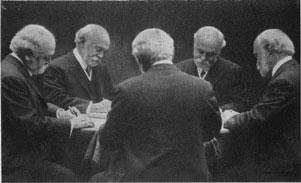I did some research this morning on the context of the North Korean issue. (Or, if you like, crisis.) First off, here’s the Agreed Framework from 1994. This is the basic agreement, brokered by Jimmy Carter and signed by Bill Clinton. It’s got three elements: North Korea agrees to stop producing plutonium, the US agrees to help them build a light-water reactor by 2003, and the US agrees to make sure North Korea has alternative energy in the form of fuel oil until the LWR gets built.
There’s also discussion of normalizing the diplomatic relationship between the two countries. Heh.
For the most part, the US lived up to its committment vis a vis energy. Let’s recognize that there have most certainly been gaps. Congress has, at times, been reluctant to approve funds for the Korean Peninsula Energy Development Organization (KEDO), the multinational agency which is building the reactor. Both Clinton and Bush have used clauses which allow them to declare KEDO funding “vital to the national security interests of the United States” in order to ensure that money keeps flowing, however.
Another important fact is that the 2003 due date was out the window years ago. This is not the fault of the Bush administration; I don’t think it’s Clinton’s fault, either. It’s a big construction project with international politics layered on top; what do you expect? The key here is that this isn’t a surprise; you can’t blame North Korea’s actions on the late delivery of the LWR. That’s been a known problem for a long time.
All in all, it appears to me as though the US has not failed to live up to the spirit of the nuclear-related sections of the Agreed Framework. The US has failed to live up to the spirit of the Framework, but that is not a new development and spans two administrations.
The diplomatic recognition aspect seems important. In some senses, it’s just a technicality, but it appears to be one that matters to North Korea. Some argue that we need to take a hardline approach and that recognition would symbolize weakness. Some argue that it would symbolize respect. I somehow suspect the answer is somewhere in between. We ought to find a similarly symbolic concession for North Korea to make, and link them: that way both countries are making symbolic concessions and meeting in the middle. In any case, though, it was not been a hot button item in 2002.
There’s also been a lot of friction over the course of the last decade regarding missile capability. In theory, missiles and nukes aren’t related. In practice, the ability to deliver nuclear weapons over long ranges obviously magnifies the nuclear threat… but wait. That’s just not true any more. One of the lessons we should have learned from 9/11 is that missiles are only one possible delivery system. I’m as scared of smuggled nuclear devices as I am of missile launches.
There’s a parenthetical discussion waiting to happen here about the need to accept that countries with nukes and no missiles are as dangerous as countries with both, in both the US and elsewhere, but maybe later. For now, let’s recognize that there’s been some missile itchyness, but that, again, it wasn’t a hot button topic during the summer of 2002. In fact, Bush signed over $95 million to KEDO last April, which is a pretty decent indication that he wasn’t deeply concerned.
What this means is that we have to look elsewhere for the cause of North Korea’s recent belligerence.
I think there are two reasons this is happening right now. First off, there’s the “Axis of Evil” meme. If you get up there, and you say “North Korea is an evil country,” that inevitably throws doubt on your intentions towards that country. I’m not saying Bush is wrong. I’m not saying North Korea isn’t dangerous. I am saying that taking a hostile attitude towards North Korea was a primary cause of the current situation. There is a price for rhetoric; that doesn’t imply that the rhetoric wasn’t worth it, but it does imply that you should acknowledge the cause and effect.
The second cause is our involvement in Iraq. If you’re going to break a treaty with the US, now is an excellent time to break it. This is true even if the US can handle two serious wars at once. Even if there are enough troops and material to deal with North Korea while we’re busy in Iraq, as long as part of the US military is elsewhere, there’s that much you don’t have to worry about.
I’d love to see Bush stand up and say “You know, this is probably happening because I took a hardline approach towards North Korea. I think that was the right thing for me to do, for reasons I’m going to discuss next, and I knew that there would be repercussions when I said those things.” I suspect some of Bush’s supporters would love that too, actually. Let’s cut through all the underbrush and the pretense that Bush wasn’t following through with the Framework and the pretense that North Korea was going to be placid about this Axis of Evil stuff and the pretense that our involvement with Iraq has nothing to do with the timing, and get to the meat of the argument, already.
